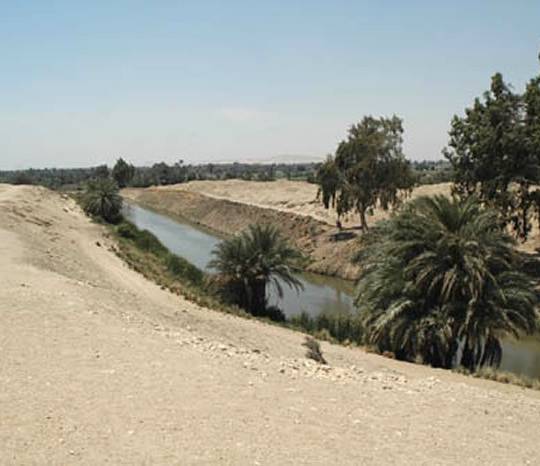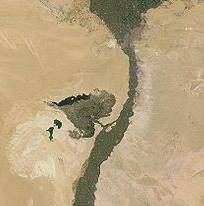Print Article
Author's Bias | Interpretation: conservative | Inclination: dispensational | Seminary: none

The Canal of Joseph seen today
The Waterway of Joseph (Bahr Yussef) can be seen today as a canal connecting the Nile River with Lake Moeris
in the area of the Faiyum Oasis. No one knows how this 200 mile waterway came to commemorate a non-Egyptian name,
but its function was to: a) control the flooding of the Nile River, b) regulate the level of the Nile River in
the summer, and c) provide irrigation for the immediate area. The Waterway of Joseph is dated to the reign of
Amenemhat III and the early rise of the city of Avaris in the region of Goshen.
Nile flood records, discovered in 1844, were inscriptions on a cliff face marking the flood
heights of the Nile. During the reign of Amenemhat III (12th dynasty), consecutive years were found to have
floods 9 meters over normal or 4x normal volume of water.
The construction of the Canal of Joseph reclaimed over 150,000 acres of the marshy Faiyum
Oasis. Amenemhat III would celebrate this accomplishment and chose to be entombed in a pyramid in Dahshūr nearby.
The only ancient historical record that may be associated with this canal is found in the Bible, and it is
the narrative of Joseph. Betrayed by his brothers, Joseph is sold as a slave:
And Judah said to his brothers, "What profit is it for us to kill our brother and
cover up his blood? Come, and let's sell him to the Ishmaelites and not lay our hands on him, for he is our
brother, our own flesh." And his brothers listened to him. Then some Midianite traders passed by, so they pulled
him out and lifted Joseph out of the pit, and sold him to the Ishmaelites for twenty shekels of silver. So they
brought Joseph into Egypt. (Gen 37:26-28)
Meanwhile, the Midianites sold him in Egypt to Potiphar, Pharaoh's officer, the
captain of the bodyguard. (Gen 37:36)
Now Joseph had been taken down to Egypt; and Potiphar, an Egyptian officer of Pharaoh,
the captain of the bodyguard, bought him from the Ishmaelites, who had taken him down there.
(Gen 39:1)
According to the Bible, God was with Joseph, and he prospered (Gen 39:2-6, 21-23).
From an early age, he had the ability to dream and interpret dreams (Gen 37:5-7, 9-11),
and he understood that these interpretations came from God (Gen 40:8).
Egyptians believed that dreams were a way in which a deity would communicate directly with a
human being. Egyptian priests were in possession of dream interpretation manuals; thus, Joseph's ability to
interpret dreams without a reference book was significant. Confirming his ability to interpret prophetic dreams
were their fulfillment, which elevated his stature (Gen 41:9-14).

Satellite view of Faiyum Oasis
When Joseph is brought to Pharaoh's attention, he is brought in to interpret Pharaoh's dream. Pharaoh's dream
is connected to the Nile River, which Joseph interprets as 7 years of plenty and 7 years of famine. For Joseph's
interpretation and recommendation to prepare for the famine, Pharaoh makes Joseph the Vizier of Egypt.
Behold, seven years of great abundance are coming in all the land of Egypt; and after
them seven years of famine will come, and all the abundance will be forgotten in the land of Egypt, and the
famine will ravage the land. So the abundance will be unknown in the land because of that subsequent famine; for
it will be very severe. Now as for the repeating of the dream to Pharaoh twice, it means that the matter is
determined by God, and God will quickly bring it about. Now let Pharaoh look for a man discerning and wise, and
set him over the land of Egypt. Let Pharaoh take action to appoint overseers in charge of the land, and let him
exact a fifth of the produce of the land of Egypt in the seven years of abundance. Then let them gather all the
food of these good years that are coming, and store up the grain for food in the cities under Pharaoh's authority,
and let them guard it. Let the food become as a reserve for the land for the seven years of famine which will
occur in the land of Egypt, so that the land will not perish during the famine." Now the proposal seemed good to
Pharaoh and to all his servants. Then Pharaoh said to his servants, "Can we find a man like this, in whom is a
divine spirit?" So Pharaoh said to Joseph, "Since God has informed you of all this, there is no one so discerning
and wise as you are. You shall be over my house, and according to your command all my people shall do homage;
only in the throne I will be greater than you." Pharaoh said to Joseph, "See, I have set you over all the land of
Egypt." Then Pharaoh took off his signet ring from his hand and put it on Joseph's hand, and clothed him in
garments of fine linen and put the gold necklace around his neck. He had him ride in his second chariot; and they
proclaimed before him, "Bow the knee!" And he set him over all the land of Egypt. Moreover, Pharaoh said to
Joseph, "Though I am Pharaoh, yet without your permission no one shall raise his hand or foot in all the land of
Egypt." Then Pharaoh named Joseph Zaphenath-paneah; and he gave him Asenath, the daughter of Potiphera priest of
On, as his wife. And Joseph went forth over the land of Egypt. (Gen 41:29-45)
The dating of the Canal of Joseph to this period is consistent and supportive of the Bible's record of Joseph
preparing for the famine (Gen 41:46-49). As the famine became
increasingly severe over the seven years, the stress of buying food increased: people exhausted their savings
(Gen 41:53-57), sold their livestock to Pharaoh, and ultimately
sold their land to purchase food stored in Pharaoh's granaries. At the last resort, on the people's suggestioin,
Joseph adapts his plans of providing food to people by developing an equitable tenant farmer / sharecropper
solution.
Now there was no food in all the land, because the famine was very severe, so that the
land of Egypt and the land of Canaan languished because of the famine. And Joseph collected all the money that
was found in the land of Egypt and in the land of Canaan in payment for the grain which they bought, and Joseph
brought the money into Pharaoh's house. When the money was all spent in the land of Egypt and in the land of
Canaan, all the Egyptians came to Joseph saying, "Give us food, for why should we die in your presence? For our
money is gone." Then Joseph said, "Give up your livestock, and I will give you food for your livestock, since
your money is gone." So they brought their livestock to Joseph, and Joseph gave them food in exchange for the
horses and the flocks and the herds and the donkeys; and he fed them with food in exchange for all their
livestock that year. But when that year ended, they came to him the next year and said to him, "We will not hide
from my lord the fact that our money is all spent, and the livestock are my lord's. There is nothing left for my
lord except our bodies and our lands. Why should we die before your eyes, both we and our land? Buy us and our
land for food, and we and our land will be slaves to Pharaoh. So give us seed, so that we may live and not die,
and that the land may not be desolate." So Joseph bought all the land of Egypt for Pharaoh, for every Egyptian
sold his field, because the famine was severe upon them. So the land became Pharaoh's. As for the people, he
relocated them to the cities from one end of Egypt's border to the other. Only the land of the priests he did
not buy, because the priests had an allotment from Pharaoh, and they lived off the allotment which Pharaoh gave
them. Therefore, they did not sell their land. Then Joseph said to the people, "Behold, today I have purchased
you and your land for Pharaoh; now, here is seed for you, and you may sow the land. At the harvest you shall
give a fifth to Pharaoh, and four-fifths shall be your own for seed of the field and for your food, and for
those of your households and as food for your little ones." So they said, "You have saved our lives! Let us find
favor in the sight of my lord, and we will be Pharaoh's slaves." Joseph made it a statute concerning the land of
Egypt, valid to this day, that Pharaoh was to have the fifth; only the land of the priests did not become
Pharaoh's. (Gen 47:13-26)
From an archaeological perspective, the reign of Amenemhat III is considered the Golden Age of the Middle
Kingdom when Egypt experienced its highest level of peace and economic prosperity.
Egypt was divided into territorial areas called "nomes," led by "nomarchs," who were
responsible for administrative duties such as tax collection. These "governors" had significant power and wealth,
and if Pharaoh was weak, they could be strong enough to assert themselves locally or nationally to become
Pharaoh.
However, unique to Amenemhat III's reign, the nomarchs are powerless; all the wealth and
power is concentrated with Pharaoh. A new agricultural office is set up, called the Department of the People's
Giving in which people sold their excess crops to the government storehouses where they were kept and later sold
/ distributed in times of crisis like a famine.
This archaeological historical record of both the Canal of Joseph and the golden age of Amenemhat III appears
to be consistent with the biblical account of Joseph and correlates very well. Despite this strong
circumstantial evidence, it is difficult to make the definitive claim that the biblical Joseph is the one
responsible for the Canal of Joseph and the golden age of Amenemhat III. There are significant inconsistencies
and disagreements of interpretation of the archaeological data and among them:
The dating of Israel's entrance into Egypt. The dispute correlating the biblical chronology
to Egyptian dynasty chronology centers on the time associated with intermediate periods, a time when there was
no central government and nomarchs competed for power.
The Egyptian record of history lacks an account mentioning the name of a person of Joseph's
stature that matches the biblical account nor the details of the biblical account. While there are many reasons
for this silence of data, the explicit connection is all the more challenged.
Nonetheless, without the biblical account, historians are left with little explanation of the archaeological
data. With the biblical account strongly supported by archaeological data, it shifts the scientific focus on to
the assumptions that form the basis of various archaeological interpretations.
References:
1. Mahoney T, Patterns of Evidence: Exodus, Minneapolis: Thinking Man Films, (2015).
Copyright ©
2021
Helpmewithbiblestudy.org. All rights to this material are reserved. We encourage you to print the material for personal and
non-profit use or link to this site. If you find this article to be a blessing, please share the link so that it may rise in
search engine rankings.